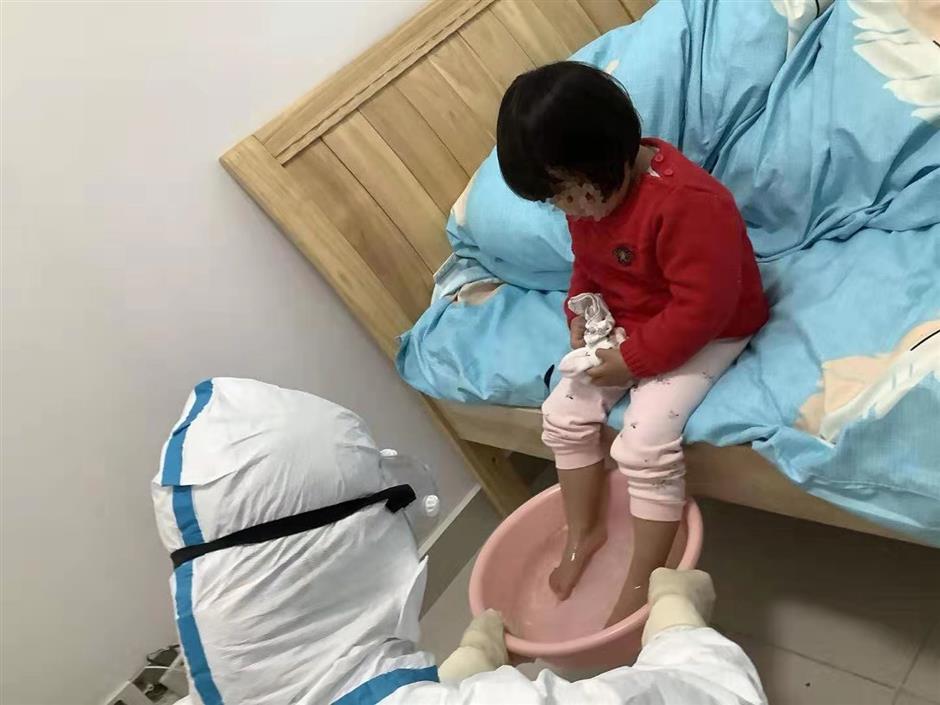Volunteer 'mothers' care for children under quarantine
When an 8-year-old boy and a 2-year-old girl from Wuhan, Hubei Province, the epicenter of the novel coronavirus outbreak, were left alone after their parents and grandmother became infected, seven volunteers offered them a temporary home in Hangzhou for two weeks.
The family went back to Hangzhou from their hometown, Wuhan, after a Chinese New Year family reunion. After their arrival, all adults were diagnosed with novel coronavirus pneumonia and isolated for medical treatment on January 28.
“The family had no other relatives in Hangzhou, which meant the children had nowhere to go. The girl is only 2 years old. Taking care of them is not an easy thing,” said Hu Jianjiang, vice director of the Binjiang District Center for Disease Control.
Binjiang District officials discussed ways to help the children and realized they had to provide necessary treatment to them as well.
As close contacts of coronavirus patients, the youngsters were at risk of infection.
Thus, they had to be put into quarantine for at least 14 days of medical observation at a designated site in Xixing Subdistrict, Binjiang District.

A volunteer mother takes care of the two children who were quarantined for two weeks in Hangzhou as their parents were diagnosed with novel coronavirus pneumonia and isolated for medical treatment.

A volunteer helps wash feet for the 2-year-old girl in Binjiang District.
On January 28, the district government began recruiting volunteers from local communities to take care of the children for two weeks.
Moreover, the volunteers would require an additional 14 days of medical quarantine of their own after completing their duties.
“Those who came to take care of the children would not be able to see their own family members for at least 28 days. Also, the work was risky,” said Xu Jian, vice director of the Binjiang District Social Development Bureau. “I thought it would be difficult to recruit volunteers, but, in fact, it was not.”
Shao Huixia, a nurse from Xixing Subdistrict Clinic, signed up without hesitation.
She then asked her colleague, Fu Jing, if she would come too. Fu agreed immediately.
Cheng Hongmei and Tang Chunyan, nurses from Changhe Subdistrict Clinic, joined them upon hearing of the recruitment.
Cheng has experience in epidemic prevention as she worked to fight the SARS outbreak in 2003.
Two nurses from Puyan Subdistrict Clinic, Huang Lubao and Chai Congcong, also participated in the voluntary work. You Li, the parents’ colleague, became the seventh volunteer.
On January 28, local government invited professional medical workers from the Zhejiang Children’s Hospital to train the seven temporary “mothers” in caring for the children. That evening, the kids started to live in their temporary “home” and the volunteers took care of them in six-hour shifts.
Xixing Subdistrict also staffed the temporary “home” with security workers and cleaners. Other voluntary social workers sent meals.
Since the children were close contacts of known novel coronavirus patients, volunteers had to wear personal protective equipment while on duty, including a pair of goggles, gloves, boots and a protective suit to prevent cross-infection.
Aside from observing the children for signs of infection, the “mothers” also entertained them with picture books, toys and an iPad.
“During the first couple of days, the girl was missing her mother so badly. She would cry her heart out in the middle of the night. I have no child and no experience, but tried to calm her down,” said Chai.
Lai Yuting, a math teacher from Hangzhou Qiantang Experiment Primary School, contacted the Xixing Subdistrict and gave online classes to the 8-year-old boy.
On February 11, the children were finally ruled out for infection and saw the real faces of their seven temporary “mothers” for the first time after they took off their protective gear. Now, the volunteers are taking their own turn under medical confinement.
On the same day, the Binjiang District government rewarded the seven women for their dedication in voluntary work.
On February 4, the Hangzhou government released measures aimed at protecting and caring for children during the epidemic.
Government departments, as well as administration committees of neighborhood and villages, will record the information and health conditions of vulnerable children, including orphans, left-behind children and those whose parents are under isolated medical treatment and observation.
The measures also include psychosocial services for children. Child-centered counseling is available via the hotline (0571) 12355.

















